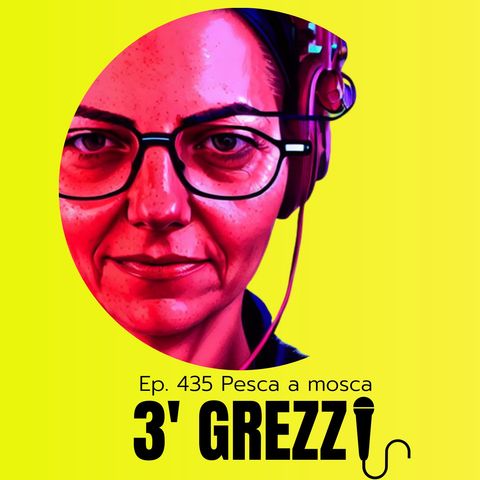3' grezzi Ep. 435 Pesca a mosca

Scarica e ascolta ovunque
Scarica i tuoi episodi preferiti e goditi l'ascolto, ovunque tu sia! Iscriviti o accedi ora per ascoltare offline.
3' grezzi Ep. 435 Pesca a mosca
Descrizione
Piccole creazioni coloratissime e affascinanti. Non sono una pescatrice ma le esche usate per la pesca a mosca sono opere d'arte. Entrate in un mondo sconosciuto. Link al libro illustrato...
mostra di piùTRASCRIZIONE [ENG translation below]
Non sono una pescatrice, forse ho provato due tre volte in vita mia a pescare, sempre con amici che anche loro non erano grandi pescatori però si faceva la gita da qualche parte, qualcuno poi tirava fuori l'amo con la lenza, io lo buttavo e non succedeva naturalmente niente, era più che altro un pretesto per fare quello che vedevamo fare agli altri nei film e alla televisione.
Però c'è un aspetto della pesca che mi ha sempre interessato. C'è una parte dei supermercati che quando abitavo a Melbourne io andavo sempre religiosamente a visitare, anche se appunto non sono una pescatrice. Era quella parte del supermercato dedicata all'esposizione delle mosche.
Le mosche sono forse gli avrete visti, Quelle specie di insetti finti creati con piume, palline e altre cose artificiali coloratissime che si usano per la pesca a mosca.
Che mi risulti non è molto diffusa qui in Italia, anche se stranamente la pesca a mosca se la sono inventata gli antichi romani che usavano appunto delle mosche, credo vive, per poter andare a pescare.
Da allora, dall'epoca degli antichi romani, si è evoluta tantissimo e infatti le mosche sono delle vere e proprie opere d'arte. Io andavo a guardarli perché mi ricordavano molto gli orecchini coloratissimi degli anni '80, ma sono veramente affascinanti.
C'è tutta una una filosofia, una storia dietro all'uso delle mosche per la pesca, infatti è proprio un'arte quello della costruzione delle mosche. Usano piume di uccelli oppure anche materiali artificiali, però c'è qualcuno che addirittura va a rubare, successo, è andato a rubare degli esemplari di uccelli impagliati da un museo per prendere le piume e usarle proprio per fare questa pesca alla mosca che richiede moltissima abilità, perché bisogna anzitutto conoscere gli abitudini alimentari dei pesci, quali sono gli insetti che piacciono, e poi bisogna studiare molto attentamente questi insetti perché evidentemente i pesci poi riconoscono un insetto dall'altro. Non è che poi si riproducano esattamente, almeno non credo, credo che più che altro si costruisca qualcosa che richiama i colori.
Ho trovato su internet un un vecchio libro dell'ottocento con dei bellissimi disegni di questi tipi di mosche per pescare tutti i tipi di pesci possibili e immaginabili, sono delle bellissime stampe immagino fatti a mano, naturalmente fatti a mano, vi metterò il link nelle note del programma a fondo pagina. Guardatelo perché farete un viaggio in un mondo sconosciuto.
TRANSLATION
I'm not a fisherperson, maybe I've tried two or three times in my life to fish, always with friends who weren't great fisherpeople either, but we went on a trip somewhere, then someone pulled out the hook with a line, I threw it away and of course nothing happened, it was more of a pretext to do what we saw other people doing in movies and on television.
But there is one aspect of fishing that has always fascinated me. There is a part of the supermarkets that when I lived in Melbourne I always religiously went to visit, even if I'm not a fisherperson. It was that part of the supermarket dedicated to displaying flies. You may have seen flies, those kind of fake insects created with feathers, tiny balls and other colorful artificial things that are used for fly fishing.
As far as I know it is not very widespread here in Italy, even if, strangely enough, fly fishing was invented by the ancient Romans who used flies, I believe real ones, to fish. Since then, since the time of the ancient Romans, it has evolved a lot and in fact flies are real works of art.
I loved looking at them because they reminded me of the very colorful earrings of the 80s, but they are really fascinating. There is a whole philosophy, a story behind the use of flies for fishing, in fact the fly tying is really an art. They use bird feathers and artificial materials, but there is someone who even goes to steal, it happened, he stole specimens of stuffed birds from a museum to take the feathers and use them to do this fly fishing that requires a lot ability, because first of all it is necessary to know the alimentary habits of the fish, which insects they like, and then it is necessary to study these insects very carefully because evidently the fish then recognize one insect from the other. It's not that they are reproduced exactly, at least I don't think so, I believe that more than anything else you build something that recalls the colours.
I found on the internet an old book from the 19th century with some beautiful drawings of these types of flies for catching all types of fish imaginable, they are beautiful prints I imagine handmade, naturally handmade, I will put the link in the program notes at the bottom of the page. Watch it because you will take a journey into an unknown world.
LINK
Un meraviglioso libro con i disegni delle mosche
Il ladro di piume
Informazioni
| Autore | M. Cristina Marras |
| Organizzazione | M. Cristina Marras |
| Sito | - |
| Tag |
Copyright 2024 - Spreaker Inc. an iHeartMedia Company
